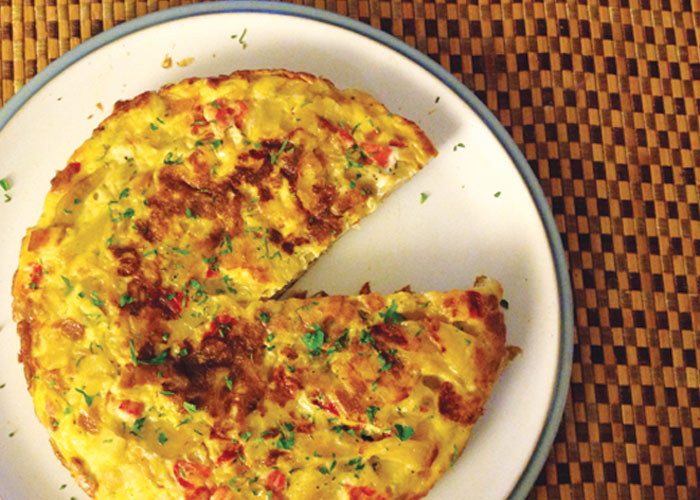|

This spanish tortilla/omelette is another great vegetarian and lactose-free recipe that would make a great brunch, lunch or dinner, and can be eaten hot or cold (so versatile!)
Eggs really are, as the slogan goes, incredible! The all-natural, high-quality protein found in eggs can play a role in weight management, helps you to feel fuller longer, and can also build muscle strength and help prevent muscle loss. Egg yolks are a source of choline, an essential nutrient that contributes to fetal brain development and helps prevent birth defects. Choline also aids the brain function and memory of adults by maintaining the structure of brain cell membranes, and is a key component of the neuro-transmitter that helps transport messages from the brain through nerves to muscles. Antioxidants, lutein and zeaxanthin, help prevent macular degeneration, a leading cause of age-related blindness.
Eggs do contain cholesterol however—the average large egg contains 212 milligrams of cholesterol, all of which is found in the egg yolk. The good news is that recent research has shown that moderate egg consumption—up to one a day—does not increase heart disease risk in healthy individuals. For people who have diabetes and heart disease, it is best to limit egg consumption to no more than three yolks per week.
Eggs can be yummy, and can be tranformed into many yummy things. But not all eggs are created equally: Eggs from chickens that are kept in appalling conditions, crammed into pens smaller than a letter-size piece of paper, never seeing daylight, that are starved for up to 2 weeks in order to make them more productive egg layers, are not at all appetizing. Trying to avoid such eggs can be confusing: Cage free, Free Roam, Free Range, Organic, Vegetarian—all these labels leave me in a flap. What do these labels really mean? For the most part, these labels are surprisingly deceptive. Want to know What’s What? View my in(food)graphic, here.
This recipe serves four.
20 minutes prep, plus 45 minutes cooking.
Ingredients
2 medium russet potatoes, peeled and sliced into thin discs
Extra-virgin olive oil (about 4 cups)
1 medium onion, thinly sliced
3 teaspoons kosher salt
7 large eggs
1/4 cup roasted red peppers, cut into strips
Chopped fresh parsley, for garnish
Directions
Soak potato slices in water for 10 minutes. Drain and dry completely in a salad spinner. Fill a large saucepan with an inch-deep of olive oil. Heat over medium heat.
Add onions and fry, until just golden, about 8 minutes.
Scoop the onions from the oil and drain on a paper-towel lined baking sheet.
Add half of the potatoes to the same oil, and fry until lightly golden, about 10 minutes.
Scoop the potatoes from the oil. Save the oil for use later in the recipe.
Repeat with the rest of the potatoes. Slice all fried potatoes into strips.
Mix the potatoes to the onions and season with 2 teaspoons of the salt.
Break the eggs into a large bowl and lightly whisk.
Add the onions, potatoes, peppers and 1 teaspoon salt to the eggs.
Heat 2 tablespoons of the oil in a 9-10-inch nonstick pan, over medium heat.
Add the egg mixture and stir with a spatula, about 2 to 3 minutes.
Stop stirring and reduce the heat to low, cover and cook until the eggs are set but still pretty loose, about 5 minutes.
Lay a flat pan lid or a plate on top and ‘flip’ the tortilla over.
Add more oil to the pan if needed, and slide the tortilla back into the pan, cover and finish cooking until set and lightly brown, about 3 minutes.
Slide the tortilla out of the pan to a cutting board to cool.
Garnish with chopped parsley and serve.
Recipe adapted from this one.
Sources:
www.eggnutritioncenter.org
Harvard Health and Harvard School of Public Health
www.incredibleegg.org
Chung HY, et al. Lutein bioavailability is higher from lutein-enriched eggs than from supplements and spinach in men. J Nutr. 2004; 134:1887-1893.
Evans WJ. 2004. Protein Nutrition, Exercise and Aging. J Am Coll Nutr. 23(6)601S-609S.
Hu FB, Stampfer MJ, Rimm EB, et al. A prospective study of egg consumption and risk of cardiovascular disease in men and women. JAMA. 1999; 281:1387-94.
Moeller SM, et al. 2000. The Potential Role of Dietary Xanthophylls in Cataract and Age-Related Macular Degeneration. J Am Coll Nutr. 19(5):522S-527S.
Weigle DS, et al. 2005. A high-protein diet induces sustained reductions in appetite, ad libitum caloric intake, and body weight despite compensatory changes in diurnal plasma leptin and ghrelin concentrations. Am J Clin Nutr. 82:41-48.
Zeisel SH. Choline: Critical role during fetal development and dietary requirements in adults. Annu Rev Nutr, 2006; 26:229-50.
|










